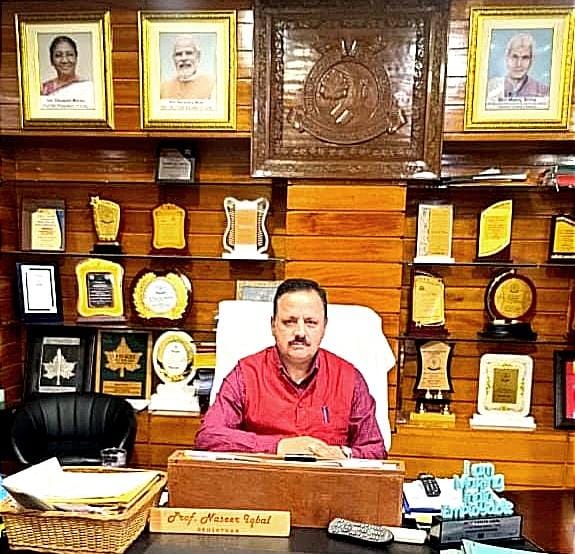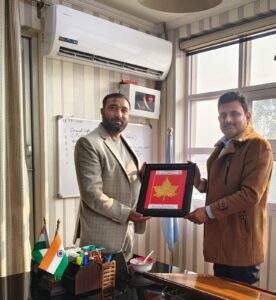Transforming Futures: An Exclusive Interview with Dr. Naseer Iqbal, Registrar of University of Kashmir

Transforming Futures: An Exclusive Interview with Dr. Naseer Iqbal, Registrar of University of Kashmir
By:- Bilal Bhat
03/10/2024 ( JKNN) Dr. Naseer Iqbal currently serves as the Registrar at the University of Kashmir. With a wealth of research experience and a distinguished academic background, he has held several key administrative positions, including Chief Proctor at the University and Director of the North Campus. He also served as Registrar and Controller of Examinations at the Islamic University of Science and Technology. In an exclusive interview with Bilal Bhat, Dr. Naseer shares insights into the university’s future roadmap, focusing on initiatives to create employment opportunities for youth. His extensive experience underscores his commitment to academic excellence and effective administration.
Awami Reporter (AR): Could you start by introducing yourself and sharing a bit about your background?
Dr. Naseer Iqbal (DNI): Certainly. My name is Naseer Iqbal, and I am a professor of physics. I come from Bandipora in North Kashmir, a region renowned for its rich cultural heritage and intellectual tradition. I completed my early education in Bandipora, followed by a Bachelor’s degree from Islamia College, Srinagar. I pursued my MSc, MPhil, and PhD at the University of Kashmir, where I have been a faculty member for nearly two decades.
Throughout my career, I have progressed from assistant professor to associate professor, and finally to full professor. My teaching responsibilities encompass various courses in the Master’s program in Physics, and I have guided numerous PhD and MPhil students while managing multiple research projects funded by different agencies. Additionally, I have held significant administrative roles, including Chief Proctor during a challenging period and Director of North Campus. Most recently, I was appointed as the Registrar of Kashmir University in February this year.
AR: What challenges do you foresee in your current role as registrar?
DNI: The challenges are considerable. Kashmir University is a vast institution with high public expectations, which includes the need to address the diverse demands of students, faculty, and civil society. I frequently receive calls from retired government officials expressing confidence in my ability to lead, which underscores the weight of responsibility I carry. The university experience profoundly impacts students’ lives, and it is my duty to ensure they receive the best education possible.
AR: What achievements has the university made recently?
DNI: Kashmir University has made remarkable strides in recent years. We consistently rank among the top 50 universities in India, and this year, we have advanced to be among the top 14 state universities. Our research output is impressive, with around 1,500 PhD scholars actively contributing to various projects. We have successfully attracted significant research funding and boast a cohort of talented researchers who have international experience.
In the coming months, we anticipate a visit from the National Assessment and Accreditation Council (NAAC) as we aim for an A++ accreditation, having completed approximately 70% of the required preparations. Moreover, we have initiated a dual degree program with foreign universities, which allows our students to engage in courses both locally and abroad, enhancing their global exposure.
AR: How is the university addressing sustainability and job creation?
DNI: We are proactively shifting our focus from merely seeking jobs to fostering job creation. The government is actively promoting entrepreneurship and innovation, and we are cultivating a startup culture within the university. Many students are eager to start their own businesses and are actively seeking mentorship to transform their ideas into viable enterprises. This initiative not only empowers students but also contributes to the local economy.
AR: What initiatives are being taken to promote diversity and inclusion at the university?
DNI: Our university is experiencing a significant increase in diversity, with students hailing from various regions and even international backgrounds. This diversity enriches our academic environment, fostering an atmosphere of inclusivity. We believe that such an environment is crucial for the holistic development of our students, enabling them to appreciate different perspectives and cultures.
AR: Are there any curriculum changes underway?
DNI: Absolutely. We are implementing the National Education Policy (NEP), which has led to transformative changes in our curriculum. This includes introducing flexibility in course delivery and credit requirements, allowing for a blend of online and offline learning. These changes are designed to enhance student engagement and cater to diverse learning styles.
AR: How does the university support research funding for students?
DNI: We actively encourage our professors to apply for research grants, which in turn provide funding for students who assist with these projects. This arrangement not only offers students valuable experience but also ensures they receive financial compensation for their contributions. It is a win-win scenario that bolsters both their academic and professional development.
AR: Mental health issues have been rising among students. What steps is the university taking to address this?
DNI: We recognize the growing importance of mental health and have established a Department of Student Welfare dedicated to this cause. We conduct regular counseling sessions and collaborate with our health center to provide comprehensive medical check-ups for students. Recently, I initiated a Residential Coaching Academy to support students preparing for competitive exams, offering free coaching to selected candidates. This holistic approach aims to nurture both the academic and mental well-being of our students.
AR: How does the university engage with local communities?
DNI: Our social work department is deeply involved in connecting with local villages, where we teach various trades and provide support. This engagement fosters meaningful relationships between the university and the community, ensuring that our students not only gain knowledge but also contribute positively to society.
AR: What are your future plans for the university?
DNI: My vision is to position Kashmir University among the top universities globally. In the short term, I aim to expedite ongoing projects while enhancing our academic offerings in the long run. I aspire for every student to graduate with dignity and integrity, equipped with the skills and knowledge to thrive in an increasingly competitive world.
AR: Any final thoughts you’d like to share?
DNI: I encourage students to work diligently and seize the abundant opportunities available to them. The world is theirs for the taking, and with unwavering dedication, they can shape their futures. Our university is here to support them every step of the way.
Through Dr. Naseer Iqbal’s leadership, Kashmir University is poised for transformative growth, emphasizing academic excellence, research innovation, and community engagement. As he embarks on this significant journey, his vision for the university encapsulates not just the aspirations of its students but also the broader potential for societal progress.
READ ALSO:









